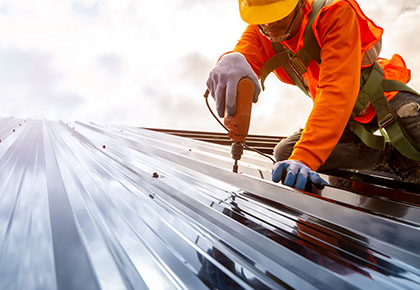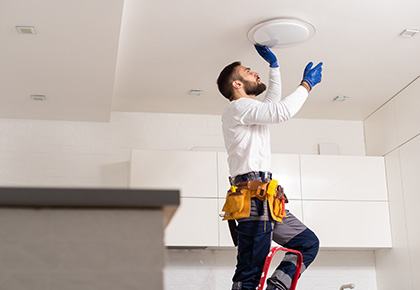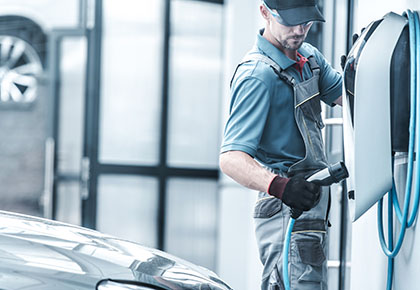-
-

Capital improvements vs repairs and maintenance: What’s the difference?
Maintaining your buildings’ assets is not a one-size-fits-all proposition. The common areas require a broad range of routine maintenance and repairs to keep them looking good and operating smoothly. -
Tips for community waste management in your association
With a growing focus on proper environmental stewardship, many associations are working toward implementing green initiatives. But getting there can be daunting. With so many programs and opportunities available for all of us to reduce, re-use and recycle, it’s hard to know where to begin. -
Is your association covered from natural disasters?
Hurricanes. Floods. Tornadoes. Hail. Wildfires. Lightning strikes. Earthquakes. Blizzards. Mother Nature has quite the arsenal to throw at us! Unfortunately, every part of North America is subject to one or more of these events. Some, like hurricanes, come with enough advance warning to prepare for them, but most do not. That’s why it is critical to the financial health of your community association to have the proper insurance coverage in place. -
Essential flash flooding safety tips to know
In many parts of the country, flash flood watches and/or flash flood warnings are often issued during torrential downpours, especially in hurricane-prone and/or low-lying areas. -
9 tips about board of directors conflicts of interest
It’s a term that gets tossed around quite a lot. But “conflict of interest” is a real and genuine threat to your association and its proper stewardship. Understanding what the term means – as well as how to recognize and avoid conflicts of interest– can go a long way toward ensuring the strength and stability of your community and eliminating many concerns. -
FirstService Residential Executive Discusses Offbeat Second Home Investment Locations and Trends
While exclusive communities like the Hamptons or Malibu will always be attractive locations for affluent vacation home buyers, several new trends are emerging in the growing second home market. -
What are power outages? Minimizing risk in your association
Losing power is never fun. But it’s bound to happen at some point, so preparation is the best defense. Obviously, different types of communities are affected by blackouts in different critical ways: high-rises lose their elevators and water; resort-style gated communities lose the ability to operate their gates. For residents, a blackout may be a short-term nuisance. For a community association, it can be a major headache in terms of risk management, safety and potential equipment damage that can provide an unwelcome shock to your budget. -
The importance of preparing for hurricanes in your HOA or community
Is your community prepared to weather a storm? June 1st marks the beginning of the 2016 hurricane season running through November 30th. The National Weather Service reports that, of an average of 12 tropical storms that form over the Atlantic Ocean each year, six become hurricanes. In the Central Pacific, an average of three tropical storms form, with two escalating to full-blown hurricane status. Figures like these make hurricanes a very real threat for many communities and homeowners. In fact, 2016 promises to be anything but your average year. Let’s take a look at why you may want to approach this year in a way that’s as unique as the weather conditions themselves. -
Preventing Fires: Fire safety in your community association
Part of your job as a board member is ensuring the safety of residents in your community association. To that end, it’s important to educate homeowners about possible fire risks and the steps they can take to prevent fire hazards in their homes. Chances are that fire safety isn’t top of mind for residents. However, home fires are more common than most people realize. -
Put an Energy Saving Program Together for a Multifamily Property
Many HOAs and community associations would like to save energy and energy spending, but they think that putting an energy management plan into place for their multifamily property is difficult to accomplish. FS Energy's Chris Normandeau explains some basic, easy-to-do steps that can make a real impact on an association's energy usage and budget. -
Hiring a reserve study company: Five things to know
In our guide to capital improvements , reserve studies and their relationship to capital improvements and preventive maintenance were discussed at length. -
Seven tips to finding a reserve study company
Your reserve fund is what helps your association anticipate its future– and budget for it, too. This fund gives you the power to maintain the quality of your community by allowing for projects that are both necessary and expensive (like a future roofing or paving project, for instance). -

5 energy conservation strategies for community associations
In this article, we delve into the significance of energy conservation within community associations, exploring its benefits and strategies for effective implementation. -
Energy efficiency tips for winter
So what can condo boards or community associations do to mitigate or even reduce costs this winter? Let’s start with what you can do in the summer and fall, before winter actually begins. This includes cleaning, tuning and performing any necessary repairs to heating systems, furnaces and boilers to make sure they won’t be working longer, harder or less efficiently than they should. Other pre-winter tasks include cleaning gutters to remove leaves and debris to ensure water can flow freely. Otherwise, water can become trapped and freeze, which can not only damage your property’s gutters, but also cause ice dams and possible roof leaks. -
Eight tips for storm and hurricane resistant landscaping
For most of us, storm season means prepping our residences to mitigate potential damage caused by high winds and heavy rains. But there’s a part of our homes and neighborhoods we often overlook – sometimes with disastrous results. That often-forgotten place is right outside your front door: it’s your landscaping. -

What to know about condo EV charging
If your high-rise condo is ready to start looking into electric vehicle charging stations, these steps can provide a holistic overview of the process and what you can expect. -

Can HOA fees increase? The benefits of raising HOA dues
What exactly are HOA dues, and can an HOA raise dues without notice? In this article, we’ll explain what HOA dues are, HOA fee increase limits, and five benefits of small, regular increases. -
Surprising ways to stretch your HOA's dollars
If you’re on the board of a condo, co-op, high-rise or HOA, you know that managing your community’s budget is a major priority. You’ve likely explored many ways to save money and get the best deals, while still maintaining a high level of service. -
Tips for an eco-friendly building: Sustainable high-rise living
Many multifamily properties and high-rises want to implement “green” living practices and create eco-friendly communities, but not everyone knows where nor how to get started. Here are some effective and easy tips to help you be proactive and successful in achieving your sustainability goals. Read on for a list of programs and services that can be put in place in your community at little to no cost. -
Mortgage loan tips: Preparing and applying for a mortgage
We’ve got the scoop on how to get a mortgage loan, so read on for our top six tips to increase your chances. -
How to start a recycling program in your community
Is your homeowners association considering starting a recycling program for your community? If so, bravo! Take a look at some of the benefits: conserving energy, saving water, preserving resources, reducing air pollution and saving landfill space. And did you know that in addition to helping the environment, recycling can also provide economic benefits as well? To get you started, here are some tips and considerations to help your association plan and implement a successful recycling program for your community. -
How can a community prepare for a tornado?
Tornadoes are fearsome because of their unpredictable nature. Although there are certain weather conditions that make tornadoes more likely, such as severe summer thunderstorms, tornadoes can also be created by snowstorms and blizzards. They can strike at any time of year and almost any place, even forming on the water and moving onto land. -

Empowering Communities: Maximizing efficiency through energy audits
Energy audits serve as a critical tool for identifying inefficiencies, pinpointing areas of improvement, and ultimately fostering a more sustainable environment within community associations.